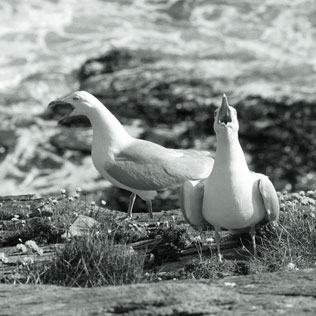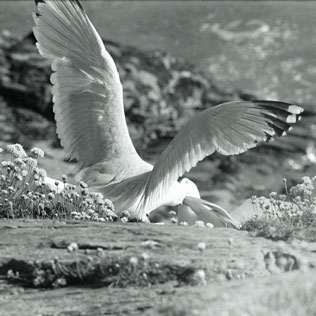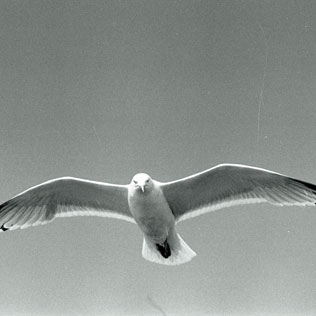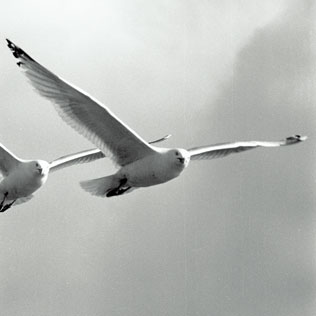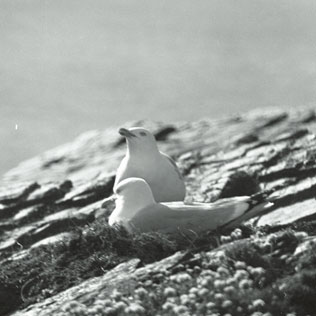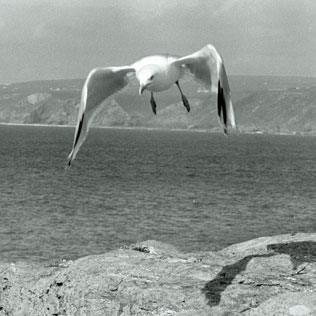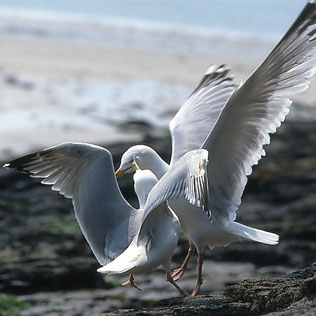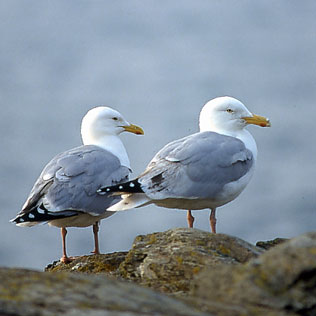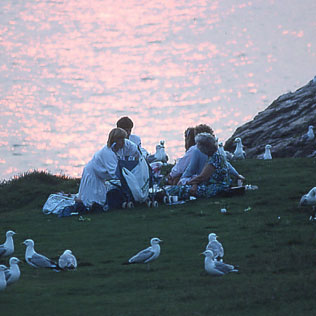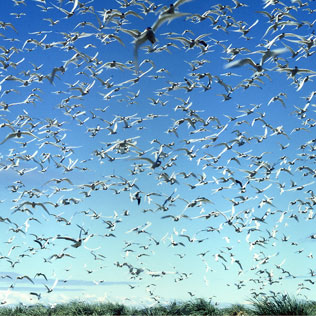The Gullery, home and online shop for Gully
the mischevious seagull childrens story books.
Home > About the Herring Gull
Taken by wildlife photographer Annie Price
The Herring Gull
Latin name: Larus argentatus
Herring gulls are without doubt the smartest looking birds on the block; bright white plumage with a soft grey mantle, and black wing tips striped with white, and gorgeous yellow bills tipped on the lower mandible with a crimson kiss (which the chicks tap for food)...wow! But everyone seems to forget this when they're being a nuisance!
The young birds in comparison look a little dowdy with their browny grey flecks and dull beaks, and in fact they do not get full adult plumage until their 4th or 5th year.
Did you know that they can live well into their thirties, and that when they find a mate, they normally stick together through thick and thin, for better or for worse, until death they do part.
Herring gulls live throughout the British Isles, both inland and on the coast. Apart from their natural habitat of cliff ledges and slopes, they have developed a penchant for nesting on buildings, not only in our quaint fishing villages but in our major cities too. It will not be long before all of our towns and cities support growing gull colonies. Like the fox before it, the gull is fast becoming urbanised, and the colonies are growing at the incredible rate of 13% a year.
When the Clean Air Act was passed in 1956, the burning of rubbish at tips was banned, and lo and behold, a continuous food supply for gulls was created. There was a sudden and massive increase in gull population, fifteen fold in fact, and gulls had to seek other breeding grounds away from their overcrowded traditional colonies. Where better than our buildings, which to a gull are nothing more than steep-cliffed islands?
So gulls are all over like a rash!
The nests that Gully and his mates build are really not worthy of the name, more just a haphazard drop of sticks, grass and other bits of rubbish on some ledge or roof or other. Into these they lay 2-4 blotchy, olive-coloured eggs every May, rural birds breeding at 4 years, and urban birds often at 3 years. At one time, the 'gullseggin' season was an important part of coastal life, and young men would go out armed with ropes and buckets and risk life and limb to harvest the eggs, often tackling high cliffs accessible only by boat, and running the gauntlet of the angry parent birds. The eggs were eaten as normal hen's eggs are, and used in cooking. They reputedly made marvellous omelettes. Of course, such things are no longer legal.
Herring gulls do not live entirely on a diet of herrings, though when you see what they eat from rubbish tips it would undoubtedly be healthier for them! They enjoy shellfish, sandworms, crustaceans, carrion, nestlings and other bird's eggs. They love Cornish pasties (especially home-made) and ice cream cornets, preferably vanilla and topped with crushed nuts, chocolate syrup and of course a flake. Those with finer tastes will seek out baked sea bass or lobster thermidor from the rear of posh restaurants. No self respecting gull would ever be seen carrying off a turkey twizzler in this day and age!
In cities, gulls help the local authorities keep the streets clean by finishing off all the leftover takeaways in the early hours of the morning, thus adding nocturnal activity to their repertoire, feeding happily in the orange glow of the street lights.
Herring gulls make a wide and fascinating range of calls, cries and screams, which many natural history books try to describe in words. How does 'qua, qua, qua,' sound? Go on, do it! Now, does that sound like a gull to you? What about 'kee-ow, kee-ow, kee-ow,'? Go on, I dare you, close your eyes and do it. Now, does it feel like you're at the seaside? Can you smell the salt air? No, I thought not...Anyway, I like the call that sounds like a small dog with a heavy cold trying to growl, a sort of 'graa, graa...'Oh never mind, just listen for yourself!
